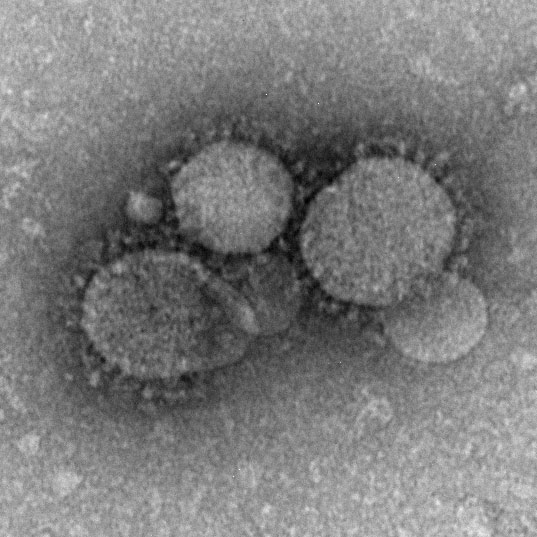MERS-CoV (Middle East Respiratory Syndrome Coronavirus), previously
known as the Novel Coronavirus or SARS-like virus, is a member of the
coronavirus family.
Coronaviruses
commonly cause respiratory illness in mammals, including humans.
Coronaviruses are responsible for approximately 1 in every 3 cases of
the common cold. MERS-CoV is much more deadly than any other coronavirus
seen before.
MERS-CoV is a new coronavirus strain that appeared last year. It
started making people ill in the Middle East in 2012 and was first
identified when a man in Saudi Arabia came down with "SARS-like"
symptoms. He died in June 2012.
A few months later, a man from Qatar became ill with similar symptoms
after returning from a trip to Saudi Arabia. He was airlifted to the
United Kingdom for further treatment, where laboratory tests confirmed
he had been infected with MERS-CoV.
So far, cases of confirmed MERS-CoV infections have been reported in:
- United Kingdom
- UAE (United Arab Emirates)
- Tunisia
- Saudi Arabia
- Qatar
- Jordan
- Italy
- Germany
- France

MERS-CoV - Notice the "corona" (crown) like projections around them
What are the signs and symptoms of MERS-CoV infection?
Not all infected people have symptoms, i.e. some individuals may be infected with MERS-CoV and do not get ill. An infected man in Jordan had no symptoms at all.Infected patients may have the following signs and symptoms:
- Coughing
- Mucous
- Shortness of breath
- Malaise - a general feeling of being unwell
- Chest pain
- Fever
- Diarrhea (in some cases)
- Renal (kidney) failure
What are the treatment options for MERS-CoV infection?
According to the US Centers for Disease Control and Prevention (CDC) and WHO (World Health Organization), there are no specific treatments for patients who become ill with MERS-CoV infection.All doctors can currently do is provide supportive medical care to help relieve the symptoms. Supportive care means providing treatment to prevent, control or relieve complications and side effects, as well as attempting to improve the patient's comfort and quality of life. Supportive care (supportive therapy) does not include treating or improving the illness/condition.
What are the possible complications linked to MERS-CoV infection?
- Pneumonia
- Kidney failure
- Death - over 60% of infected patients die
Who are more vulnerable to infections and complications?
The following groups of people are more susceptible to MERS-CoV infections and complications:- Patients with chronic diseases, such as diabetes and heart conditions
- Organ transplant recipients who are on immunosuppressive medications
- Other patients whose immune systems are weak, such as cancer patients undergoing treatment
- Of the over sixty cases of MERS-CoV infections confirmed so far, the vast majority have been male (it is too early to confirm that males are more vulnerable than females)
How dangerous is MERS-CoV compared to SARS-CoV?
SARS-CoV is more human-transmissible than MERS-CoV. However, MERS-CoV is more deadly:- 0ver 60% of people infected with MERS-CoV so far have died
- SARS-CoV had a death rate of approximately 10%
- Experts have noticed that MERS-CoV is more human-transmissible in hospital settings than originally thought
- We know very little about MERS-CoV - we don't know where it comes from, experts believe MERS originated from bats. Nobody is quite sure how many people are infected without symptoms. Until scientists know more about this new virus strain, it is difficult to determine whether it is a serious public health threat. According to Margaret Chan, Director General of WHO, "(MERS-CoV) is a threat to the entire world".
How can I protect myself from MERS-CoV infection?
As nobody knows what the source of transmission of MERS-CoV is, exactly how people become infected, or its mode of transmission, WHO says it cannot give specific advice on prevention of infection.Could camels be a reservoir for the MERS coronavirus? - researchers from the Dutch National Institute of Public Health reported in Lancet Infectious Diseases that they found traces of MERS-CoV antibodies in camels in Spain's Canary Islands and Oman. The authors say their discovery could help establish how the virus is passed on to humans.
If you are in an area known to have cases of MERS-CoV infections, WHO, CDC and HPA (Health Protection Agency, UK) suggest people take measures currently advised for any kind of respiratory illness, including:
- Avoid contact with people with symptoms of disease
- Maintain good hand hygiene
- Avoid unwashed vegetables and fruits
- Avoid uncooked or undercooked meats
- Make sure the water you drink is sterilized

No comments:
Post a Comment